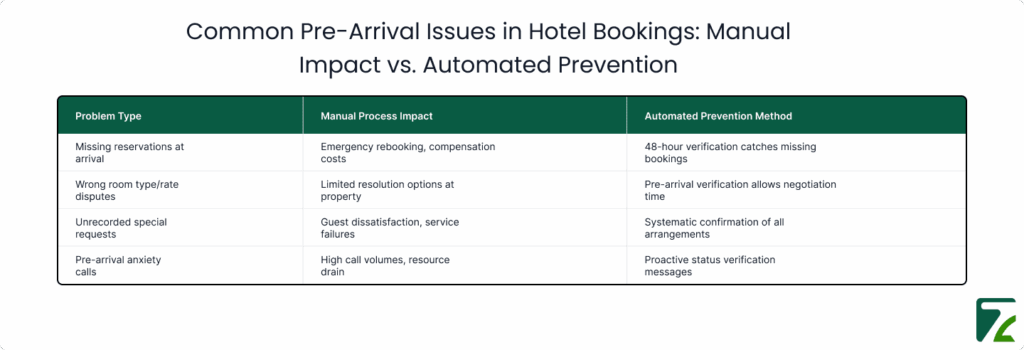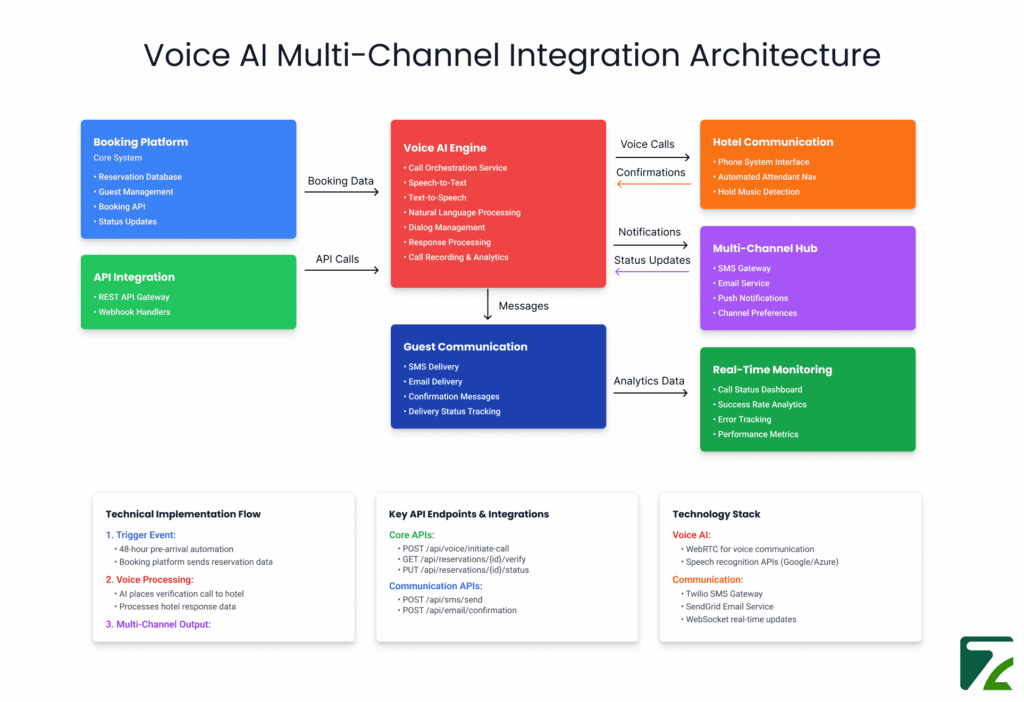Travel agencies have a perennial problem: customers phoning on arrival to complain about hotel reservation problems. Reconfirmation : the activity of validating the status of a booking at a hotel to avoid an unpleasant situations with a guest upon arrival is a process that usually requires manual intervention and doesn’t always avert issues with our customers. Automated hotel booking reconfirmation solutions solve this problem by automatically checking the reservation status 48 hours prior to guest check-in and can significantly reduce customer service call volume.
The call volume is dropping because automated systems are able to check, confirm reservations and request resolution of issues far in advance of guests ever arriving at hotels. The majority of arrival issues that would normally result in missed service calls (and people frustrated and angry in the lobby) can be mitigated by actively confirming that there are reservations, and they are accurately in the hotel’s systems.
The most frequent customer service call about hotel reservations occurs when your guests arrive and faces unexpected problems that might have been avoided by reconfirming the reservation. Knowing these arrival-focused problems explains why there is a dramatic drop in call volume when the status of the reservation can be verified prior to arrival.
‘Hotel Says No Reservation’ Crisis Calls: The crisis calls that are usually the most urgent, time-consuming and resource-draining, those in which guests show up at hotels to find that they do not have reservations in the hotel system. These are emergency issues that need immediate resolution (often time outside of normal business hours, a need to re-book the customer at ultra-huge rates and compensate for customer discomfort).
Calls Complaining of “Wrong Room Type/Rate”: Guests bring pressure on when hotels can’t make good on a reserved room type or rate and insist on negotiations or alternative accommodations at the last minute. These are the type of calls that happen when the customer is already on site with no easy fixes and lots of frustration involved.
“Special Request Not Noted” Calls: These occur when a hotel does not note a special request (i.e. wheelchair accessible room, connecting room, dietary need) and the guest is frustrated with the oversight upon arrival, creating service failures that result in complaint calls.
Anxiety and Pre-Arrival Verification Calls: In the absence of proactive reconfirmation, anxious guest are known to call pre-arrival pleading with an agent to “please confirm my reservation is fine.” This is one example of the reassurance request calls that account for a large percentage of reservation service volume.
In many cases even if there are manual hotel booking re-confirmation processes, these are not catching reservation status problems often enough to avoid arrival issues. Industry reports suggest that the average email response time for both hotel companies and travel agencies is about 12.5 hours, which creates an opportunity for reservation status issues to go undetected until guests are on their way.
Automated hotel booking reconfirmation systems that have been developed are capable of calling out to hotels prior to guest arrival in order to confirm reservation status, thus minimizing call volume. The 48-hour advance confirmation window allows time for addressing reservation status problems which might arise incident to a guest’s arrival.
The voice calls, powered by AI, call hotels within 48 hours of guest arrival, to confirm if the reservations are made and correctly recorded in the hotel systems. The automated system prompts the hotel staff to confirm:
This systematic verification process eliminates the most common cause of customer service calls: guests arriving at hotels where their reservations are missing, incorrect, or incomplete.
If the automatic hotel booking reconfirmation finds status problems which include missed reservations, incorrect room types, or special requests which had not been recorded, the agency will have several alternatives to correct the problems during the business day. It prevents the most maddening and expensive customer service situations like hotel guests calling in a panic because a room has arrived in the wrong city.
The 48-hour timeframe allows agencies to:
As soon as the systems could appropriately verify reservation status, the customer would then be sent a verification message by agencies such as: Your reservation at Hotel ABC has been confirmed with the hotel for check-in tomorrow. This preemptive communication saves travelers from making anxiety-induced calls to get reassured about the status of their reservation.
Custom Travel Solutions’ application shows these savings in action, so to speak. They reduced arrival-related issues that would have otherwise created customer service calls by 87% and did so through a systematic check of more than 4,000 daily bookings via AI calls 48 hours prior to guest check-in to check the status of reservations.

The monetary and financial effects are not just limited to a decrease in the number of calls received. As per industry reports, automation facilitated via AI has caused a 30% reduction in customer service costs overall by automating processes and reducing the need for human intervention. With prevention of arriving problems via structured reservation status checking, agencies shift their service resources from crisis handling to customer relationship management.
When the customer first encounters a reservation problem, their resolution includes emergency after-hours support availability, an alternative accommodation at premium rates, customer compensation for inconvenience, and more than one call-back to see if the customer is satisfied. Automated hotel booking reconfirmation resolves these expensive possibilities by verifying reservation status and taking care of any problems prior to guest arrival.
The successful implementation of automated hotel booking reconfirmation involves interfacing with travel agency technology systems and the retention of connectivity with hotel communication protocols.

New automated hotel booking reconfirmation systems employ advanced voice AI technology which is designed to navigate complicated hotel phone systems, automated attendants, music on hold and transfers. The bots engage in human-like conversation and ask hotel staff for very specific confirmation information, recording the answers to that and other questions for review by the agency.
Real-time automated hotel booking re-confirmation works through various communication mediums at a time. Once reservation status is checked, the workflows can send confirmation details by email, SMS, and voice call to ensure delivery of information to a customer’s preferred communication channels.
Agencies’ Customer Management System integration allows for up-to-the-second status updates at every customer’s touchpoint. This end-to-end approach means that when customers get in touch with agencies via any channel, agents can instantly check for up-to-date verification and confirmation information.
Automated hotel booking reconfirmation needs to be supported with thorough performance measurements to determine the benefits that call reduction offers and to highlight potential for improvement. Good measurement programs monitor operational measurements as well as customer experience measurements.
Agencies can utilize tracking mechanisms to collect total inbound call volumes before and after automation, reservation focused call as a percentage of total call, average call resolution times for the remaining manual call types, and customer satisfaction scores for reservation confirmations.
Various hotels support different levels of automation for reconfirmation. Hotel-specific performance data monitoring is used to identify areas of optimization and integration improvement as well as inform hotel relationship management strategies.
On the traveler side, automatic hotel booking reconfirmation saves the frustration and hassle of arrival problems riddled with manual work. 60% of travelers change travel brands after only 1–2 bad experiences of service while 86% of consumers are willing to pay more for a better experience of customer service. (Travel Daily News) Systematic confirmation of reservations directly satisfies these expectations by offering:
No Arrival Surprises: Proactive reconfirmation just two days prior to arrival allows to verify reservation status and resolution of any issue preventing unpleasant surprises upon arrival when limited alternatives are available.
Assurance for planning travel: Travelers can verify status before setting out on their trips and avoid planning travel when space is not available to them.
Less Stress associated with Travel: When someone calls the agency about their stay, he or she is typically anxious to know that things are proceeding normally as planned.
For travel agencies contemplating automatedhotel booking reconfirmation deployment, phased roll-outs allowing for minimal process interruption and maximum call deflection should be pursued.
For agencies reconfirming many thousands of hotel bookings every day, to manually reconfirm takes up staff time (submitting each reconfirm can take an estimated 6 to 8 minutes when done manually, whereas an automated system can reconfirm the same volume in minutes) and get a more dependable verification than just using a follow up system or an overseas office.
Beyond the cost savings, automated hotel booking reconfirmation saves revenue streams by avoiding customer defections from arrival problems. Studies has indicated that seasonal travel agencies using a manual approach can miss out on a lot of possible bookings because of slow response time, and that there will be continued reliability of service during peak seasons when automated system is employed.
Start with simple integration with available systems for the main hotel platforms. Target high-volume hotels with strong communication policies and standard confirmation practices. Set benchmarks to take note of existing call volumes, confirmation of closures and customer satisfaction ratings.
Automate hotel booking reconfirmation for simple situations: one-night hotel reservations, regular room categories, simple booking policies. These options also have the lowest success rates and most clearly demonstrate a reduction in call volume while gaining operational experience with automated systems.
Extend automation for complex multi-room hotel reservations, group bookings and changed hotel reservations. Track performance analytics and refine per hospital response trends and customer feedback.
The proof of the value of automated hotel booking reconfirmation in reducing customer service calls is apparent, and it is actionable. CTS is proof proving that systematic confirmation of reservation status results in measurable operational benefits; It’s 87% decrease in errors processing 4,000+ bookings per day is the case.
A systematic approach takes on arrival issues with pre-arrival confirmation: a confirmed reservation puts an end to anxiety calls; early identification of problems prevents crises; and communicating your status as confirmed eliminates uncertainty-generated calls.
The systematic strategy to arrival problems works through proactive verification: not having to make anxiety calls when reservation status is verified, avoiding a crisis when a problem is detected in advance, and checking in on status verification instead of uncertainty driven contacts. The business impacts of dis-intermediation go far beyond the bottom line, with studies consistently illustrating that travelers often change their preference to other brand choices post-trauma automatic reconfirmation not only protects revenue, it also enables agencies to realize a marked increase in productivity and efficiency.
Automated hotel booking reconfirmation ensures proven, quantifiable reduction in call center volumes and enhanced customer satisfaction, as well as an extended capability to scale up operations. Travel agencies that embrace automated reservation status checking today establish the foundation for ongoing success in an industry where dependability, productivity, and client satisfaction define the future.
Travel platforms use supplier or hotel APIs to send booking requests and receive confirmations, but this doesn’t always ensure the hotel’s front desk sees the reservation.
Ideally 48 hours before guest check-in, giving enough time to detect and fix issues before arrival.
It prevents last-minute surprises by ensuring reservations are correctly recorded at the hotel, reducing customer complaints and emergency calls.
It connects with CRMs, booking platforms, and uses AI voice calls or messaging to confirm bookings, updating all systems in real time.
AI phone calls are most effective, especially with hotels. Email is slower, and SMS is best for guest notifications, not hotel verification.

Travel Automation Expert